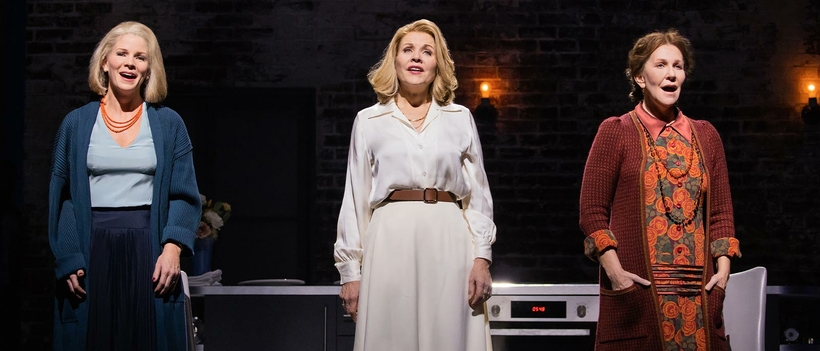Three women living their lives in different times and different places. What connects them? That’s the riddle at the heart of Michael Cunningham’s Pulitzer Prize-winning novel The Hours (1998), Stephen Daldry’s Oscar-winning movie (2002), and the opera by the Pulitzer Prize-winning composer Kevin Puts, which opened last November at the Met, livestreamed to theaters worldwide on December 10, and is now available on demand at home.
Like the movie, the opera has marquee power to burn. Renée Fleming, the prime mover of the project, takes over from Meryl Streep as Clarissa Vaughan, a New York editor organizing a party for a former lover who is dying of AIDS. The Broadway favorite Kelli O’Hara follows Julianne Moore as Laura Brown, a midcentury California homemaker a heartbeat away from walking out on her nuclear family. Rounding out the threesome, Joyce DiDonato spells a putty-nosed Nicole Kidman as Virginia Woolf wrestling with her modernist classic Mrs. Dalloway—not so incidentally the template for each component of The Hours, capturing one woman’s life in the space of a single day.

Last fall, the Met’s promotional campaign for The Hours relied heavily on transit advertising that showed its three divas singing their hearts out side by side. Reflexively, opera fans flashed on the final trio from Der Rosenkavalier, a title with which Fleming and DiDonato have had a long history. Sure enough, the new opera culminates in a trio for female voices that is the score’s crowning glory. What are those voices singing about? Who cares? This is heaven. There isn’t, and there could not be, anything like it in any other medium. Transcendence is opera’s raison d’être.
The buildup to that apotheosis unfolds for the most part stream-of-consciousness–style, in the minds of the central characters. Yet as in Woolf and in Cunningham, there’s the suggestion of more-enveloping forces at work. “Leaden circles dissolved in the air,” Woolf writes, conjuring the bells of Big Ben—a recurrent symbolist flourish that seems to reverberate through the immersive, even hallucinatory tapestry Puts has woven for the Met.

As the stage action unfolds, the orchestra surges moodily. The chorus babbles snippets of prose from Woolf and Cunningham. Spooky interludes for solo piano seem to occur at random but may follow an elusive pattern. An unidentified “Man under the Arch”—the countertenor John Holiday—warbles mysteriously (in Cunningham’s novel, there’s an “old woman”). Somehow, the overlapping sonorities all hint at resonances beyond the personal. As for the lines for the major characters, though seldom hummable, they illuminate the dialogue, and where flights of bravura or lyricism are in order, Puts has the right stuff at his fingertips.
As everyone knows, The Hours was commissioned as the vehicle for Fleming’s comeback to the Met after an absence of five years. It’s bittersweet to see her on the big stage again, poised and creamy but pallid, all but embalmed. O’Hara, frequently luminous in Tony-winning revivals of vintage musicals, lends her sad character unexpected grace, drifting into a joyless limbo of her own. In yet another enthralling impersonation, DiDonato bristles with hostility as Virginia Woolf torn between her demons and her creativity, which are hard to tell apart. And a rose, please, for Kathleen Kim as the Tinker Bell florist with whom Clarissa shares a transgressive kiss.
The Hours is one of dozens of video offerings available for streaming on the Metropolitan Opera Web site
Matthew Gurewitsch writes about opera and classical music for AIR MAIL.He lives in Hawaii

